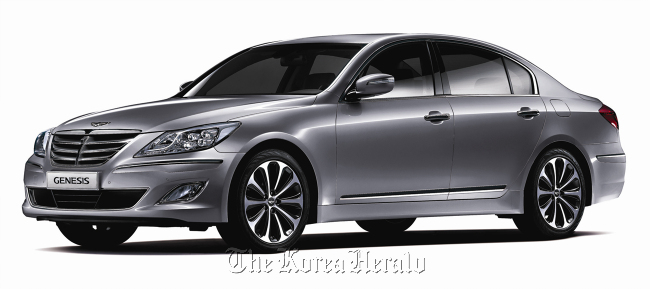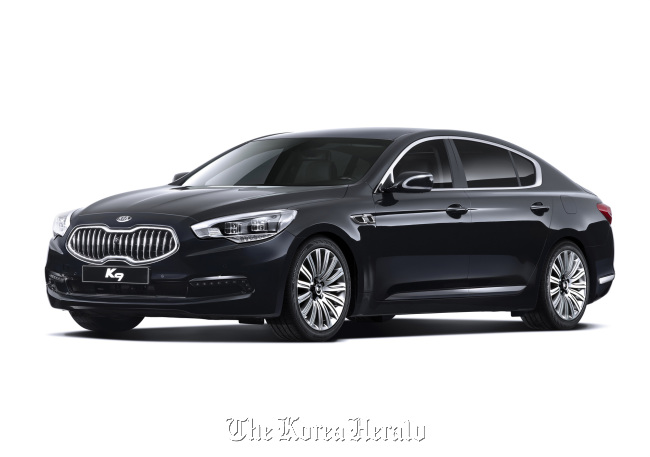Playing on home field
Slackening overseas sales force Hyundai-Kia to turn homeward
By Korea HeraldPublished : Jan. 13, 2013 - 20:20
Hyundai Motor Group has recently made an unprecedented decision to cut the prices of its flagship cars that it markets on its home turf of Korea.
As of Jan. 1, Hyundai Motor has begun to offer five midsize and large models, including the Sonata, Genesis and Santa Fe, at discounted prices of up to 1 million won less than their 2012 versions.
Its affiliate Kia Motors on Wednesday announced price cuts for popular models, unveiling the new K9 with a lowered price tag even though high-end features such as head-up display were newly adopted.


The Korean auto giant also pledged to renew its commitment to its home market by offering higher quality at more affordable prices, coupled with improved after-sales services.
“The first price cut since its establishment has a special meaning,” said Kim Pil-soo, a professor of automotive studies at Daelim College. “The move reflects Hyundai’s strong will to defend its home market from the offensive of import brands.”
He added that as car sales are slowing globally, “the first priority for carmakers is their domestic sales. Hyundai is no exception as it is already losing customers to foreign brands at home.”
In Korea, five home-grown carmakers make up almost 90 percent of the car market, with the combined market share of Hyundai and Kia, the market leaders, nearing 80 percent. This makes Korea one of the two markets, along with Japan, where local brands enjoy exceptional dominance on their home turf.


On the other side of the spectrum, Italy showed the highest market share of foreign brands at 70 percent in 2010, followed by the U.S. with 55 percent and Germany with 36 percent, according to Ward’s Automotive Yearbook.
But the nation’s import car market is becoming increasingly dynamic, and the Korean market may be following in the footsteps of import-heavy markets, albeit gradually, industry observers say. Last year, foreign car sales increased almost 25 percent to 130,858 vehicles, making up 10 percent of the market. Despite a market slowdown globally, their growth rate is expected to hit about 8 percent this year.
Hyundai and Kia, in particular, will be enviously looking at German carmakers such as BMW, Mercedes-Benz and Audi, the best-selling import brands that have maintained strong profits through pricier models.
Industry watchers say Hyundai and Kia still seem almost invincible as other three smaller carmakers ― GM Korea, Renault Samsung Motors and Ssangyong Motor ― provide a buffer to absorb shock from the increased presence of foreign brands here for now.
“But considering the cases in other countries, sluggish sales of other local brands would finally affect car sales of Hyundai and Kia and possibly Korea-made car sales overall,” said Lee Kun-hyo, managing director of Marketing Insight, a research firm.
Lee pointed out that Hyundai and Kia should more focus on increasing not just market share but also “mind share” among their home customers.
According to the director, Korean and Japanese customers used to share a similar spending pattern ― that is, they preferred local brands over the foreign ones.
But this trend seems to be changing, with local consumers increasingly emulating the Italians whose preference for foreign brands largely drove a decline in market share of Italian carmakers such as Fiat in the country.
In a recent survey by Marketing Insight, 16.5 percent of Korean respondents said they would consider purchasing an import car, up from 6 percent 10 years ago.
“Preference for import cars is more apparent among young and female customers,” Lee said, calling quality products and after-sales services the best policy for winning back customers.
Kim, the automotive professor, also said the recent price cut that excluded popular compact models is more aimed at renewing awareness among customers rather than increasing sales figures.
Following the price cut in Hyundai and Kia brand cars, GM Korea also announced Friday it has lowered prices of all segment models by up to 500,000 won, while Renault Samsung introduced a new financing program with a low interest rate.
By Lee Ji-yoon (jylee@heraldcorp.com)
As of Jan. 1, Hyundai Motor has begun to offer five midsize and large models, including the Sonata, Genesis and Santa Fe, at discounted prices of up to 1 million won less than their 2012 versions.
Its affiliate Kia Motors on Wednesday announced price cuts for popular models, unveiling the new K9 with a lowered price tag even though high-end features such as head-up display were newly adopted.


The Korean auto giant also pledged to renew its commitment to its home market by offering higher quality at more affordable prices, coupled with improved after-sales services.
“The first price cut since its establishment has a special meaning,” said Kim Pil-soo, a professor of automotive studies at Daelim College. “The move reflects Hyundai’s strong will to defend its home market from the offensive of import brands.”
He added that as car sales are slowing globally, “the first priority for carmakers is their domestic sales. Hyundai is no exception as it is already losing customers to foreign brands at home.”
In Korea, five home-grown carmakers make up almost 90 percent of the car market, with the combined market share of Hyundai and Kia, the market leaders, nearing 80 percent. This makes Korea one of the two markets, along with Japan, where local brands enjoy exceptional dominance on their home turf.


On the other side of the spectrum, Italy showed the highest market share of foreign brands at 70 percent in 2010, followed by the U.S. with 55 percent and Germany with 36 percent, according to Ward’s Automotive Yearbook.
But the nation’s import car market is becoming increasingly dynamic, and the Korean market may be following in the footsteps of import-heavy markets, albeit gradually, industry observers say. Last year, foreign car sales increased almost 25 percent to 130,858 vehicles, making up 10 percent of the market. Despite a market slowdown globally, their growth rate is expected to hit about 8 percent this year.
Hyundai and Kia, in particular, will be enviously looking at German carmakers such as BMW, Mercedes-Benz and Audi, the best-selling import brands that have maintained strong profits through pricier models.
Industry watchers say Hyundai and Kia still seem almost invincible as other three smaller carmakers ― GM Korea, Renault Samsung Motors and Ssangyong Motor ― provide a buffer to absorb shock from the increased presence of foreign brands here for now.
“But considering the cases in other countries, sluggish sales of other local brands would finally affect car sales of Hyundai and Kia and possibly Korea-made car sales overall,” said Lee Kun-hyo, managing director of Marketing Insight, a research firm.
Lee pointed out that Hyundai and Kia should more focus on increasing not just market share but also “mind share” among their home customers.
According to the director, Korean and Japanese customers used to share a similar spending pattern ― that is, they preferred local brands over the foreign ones.
But this trend seems to be changing, with local consumers increasingly emulating the Italians whose preference for foreign brands largely drove a decline in market share of Italian carmakers such as Fiat in the country.
In a recent survey by Marketing Insight, 16.5 percent of Korean respondents said they would consider purchasing an import car, up from 6 percent 10 years ago.
“Preference for import cars is more apparent among young and female customers,” Lee said, calling quality products and after-sales services the best policy for winning back customers.
Kim, the automotive professor, also said the recent price cut that excluded popular compact models is more aimed at renewing awareness among customers rather than increasing sales figures.
Following the price cut in Hyundai and Kia brand cars, GM Korea also announced Friday it has lowered prices of all segment models by up to 500,000 won, while Renault Samsung introduced a new financing program with a low interest rate.
By Lee Ji-yoon (jylee@heraldcorp.com)
-
Articles by Korea Herald



![[Weekender] Pet food makers bet big on ‘recession-free’ pet food market](http://res.heraldm.com/phpwas/restmb_idxmake.php?idx=644&simg=/content/image/2024/05/10/20240510050754_0.jpg&u=20240512145510)



![[Drama Tour] Romantic trip to ‘Queen of Tears’ filming spots](http://res.heraldm.com/phpwas/restmb_idxmake.php?idx=644&simg=/content/image/2024/05/09/20240509050798_0.jpg&u=20240511190213)











